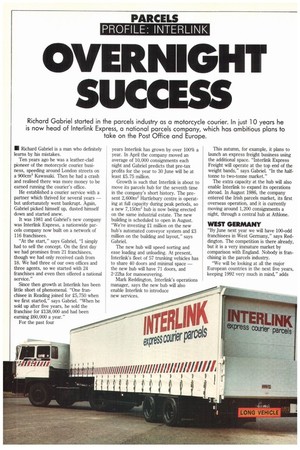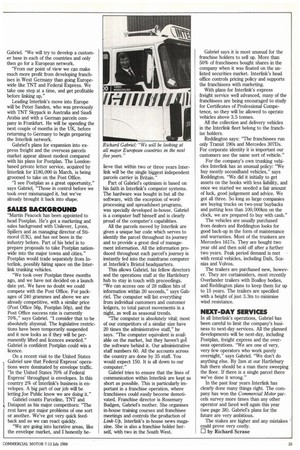OVERNIGHT
Page 28

Page 29

If you've noticed an error in this article please click here to report it so we can fix it.
Richard Gabriel started in the parcels industry as a motorcycle courier. In just 10 years he is now head of Interlink Express, a national parcels company, which has ambitious plans to take on the Post Office and Europe.
• Richard Gabriel is a man who definitely learns by his mistakes.
Ten years ago he was a leather-clad pioneer of the motorcycle courier business, speeding around London streets on a 900crn3 Kawasaki. Then he had a crash and realised there was more money to be earned running the courier's office.
He established a courier service with a partner which thrived for several years — but unfortunately went bankrupt. Again, Gabriel picked himself up, dusted himself down and started anew.
It was 1981 and Gabriel's new company was Interlink Express, a nationwide parcels company now built on a network of 116 franchisees.
"At the start," says Gabriel, "I simply had to sell the concept. On the first day we had promises from 21 franchisees, though we had only received cash from 18. We had three of our own offices and three agents, so we started with 24 franchises and even then offered a national service."
Since then growth at Interlink has been little short of phenomenal. "One franchisee in Reading joined for 25,750 when we first started," says Gabriel. "When he sold up after five years, he sold the franchise for £138,000 and had been earning £60,000 a year."
For the past four years Interlink has grown by over 100% a year. In April the company moved an average of 10,000 consignments each night and Gabriel predicts that pre-tax profits for the year to 30 June will be at least £5.75 million.
Growth is such that Interlink is about to move its parcels hub for the seventh time in the company's short history. The present 2, 600m2 Hartlebury centre is operating at full capacity during peak periods, so a new 7,150m2 hub is now being erected on the same industrial estate. The new building is scheduled to open in August. "We're investing 21 million on the new hub's automated conveyor system and £3 million on the building and layout," says Gabriel.
The new hub will speed sorting and ease loading and unloading. At present, Interlink's fleet of 57 trunking vehicles has to share 40 doors and minimal space — the new hub will have 71 doors, and 2.22ha for manoeuvering.
Mark Reddington, Interlink's operations manager, says the new hub will also enable Interlink to introduce new services.
This autumn, for example, it plans to launch an express freight business using the additional space. "Interlink Express Freight will operate at the top end of the weight bands," says Gabriel. "In the halftonne to two-tonne market."
The extra capacity at the hub will also enable Interlink to expand its operations abroad. In August 1986, the company entered the Irish parcels market, its first overseas operation, and it is currently moving around 1,200 consignments a night, through a central hub at Athlone.
WEST GERMANY
"By June next year we will have 100-odd franchisees in West Germany," says Reddington. The competition is there already, but it is a very immature market by comparison with England. Nobody is franchising in the parcels industry.
"We will be looking at all the major European countries in the next five years, keeping 1992 very much in mind," adds
Gabriel. "We will try to develop a customer base in each of the countries and only then go for a European network.
"From our point of view we can make much more profit from developing franchises in West Germany than going Europewide like TNT and Federal Express. We take one step at a time, and get profitable before linking up."
Leading Interlink's move into Europe will be Peter Sanden, who was previously with TNT Skypack in Australia and Saudi Arabia and with a German parcels company in Frankfurt. He will be spending the next couple of months in the UK, before returning to Germany to begin preparing the Interlink network.
Gabriel's plans for expansion into express freight and the overseas parcels market appear almost modest compared with his plans for Postplan. The Londonbased private letter service, acquired by Interlink for 2180,000 in March, is being groomed to take on the Post Office.
"I see Postplan as a great opportunity," says Gabriel, "Those in control before we took over mismanaged it, but we've already brought it back into shape.
SALES BACKGROUND
"Martin Peacock has been appointed to head Postplan. He's got a marketing and sales background with Unilever, Lyons, Spillers and as managing director of Stimorol (UK), and has not been in the industry before. Part of his brief is to prepare proposals to take Postplan nationwide into the major towns and cities." Postplan would trade separately from Interlink, possibly hiring space on the Interlink thinking vehicles.
"We took over Postplan three months ago, and we have not decided on a launch date yet. We have no doubt we could compete with the Post Office. For packages of 240 grammes and above we are already competitive, with a similar price (Post Office 56p, Postplan 50p), and the Post Office success rate is currently 70%," says Gabriel. "I consider that to be absolutely abysmal. The legislative restrictions have been temporarily suspended and it now looks as if they will be permanently lifted and licences awarded." Gabriel is confident Postplan could win a licence.
On a recent visit to the United States Gabriel saw that Federal Express' operations were dominated by envelope traffic. "In the United States 70% of Federal Express' throughput is envelopes. In this country 2% of Interlink's business is envelopes. A big part of our job will be letting Joe Public know we are doing it."
Gabriel counts Parceline, TNT and Datapost as his major competitors: "The rest have got major problems of one sort or another. We've got very quick feedback and so we can react quickly.
"We are going into lucrative areas, like the envelope market, and I honestly be


















































